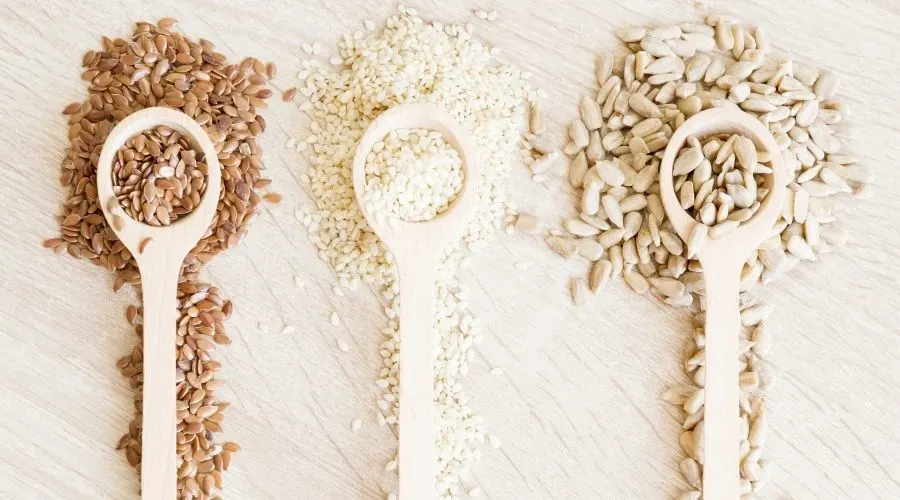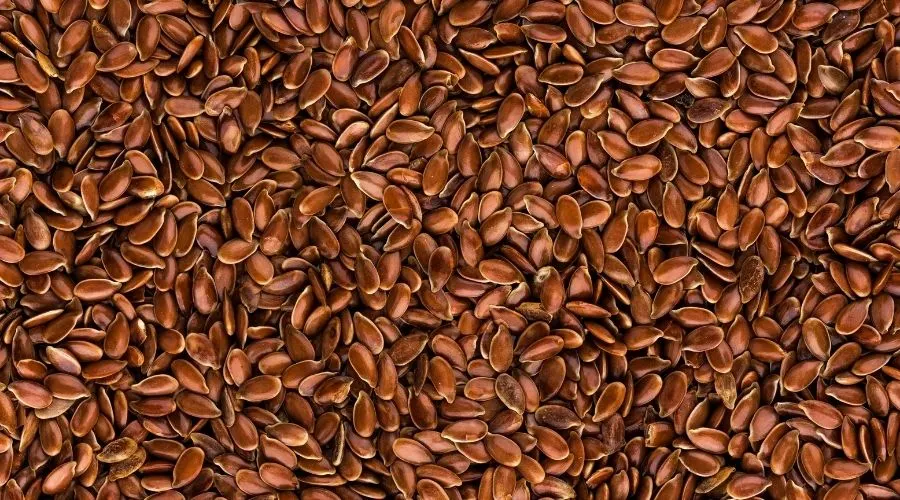Healthy eating plans and diets often recommend seeds as a nutritious snack or an addition to meals such as salads or soups.
Because most seeds are high in natural fats, they can also be pretty high in calories. So if you’re on a calorie-restricted diet, it’s a good idea to know how many calories are in your serving of seeds, so they don’t push you over your daily allowance.
In this article, I’ll list seven of the most popular kinds of seeds, from the lowest to the highest number of calories per serving, and provide nutritional facts to help you choose the best seeds to fit your dietary needs.

Lowest To Highest Calorie Seeds
The tables below show the number of calories in each kind of seed from lowest to highest, including nutritional information so you can compare each type based on your dietary needs.
Figures are based on official USDA data, and you can find source links at the bottom of this page.
A serving is based on 1oz (28.35g) – please note that recommended servings of various types of seeds can vary; however, I am using the value of one ounce to keep the comparison fair.
1 – Chia Seeds
- Lowest calorie
- Lowest fat & saturated fat
- Highest fiber
- Highest carb
Of these seven popular seeds, chia is the lowest in calories, with 138 calories (in kcal) per ounce serving.
As well as being low calorie, chia seeds are packed with nutrients such as calcium, phosphorus, and magnesium. Chia seeds are rich in antioxidants which have anti-inflammatory properties and can help to protect cells.
Chia seeds are rich in dietary fiber and are the highest in fiber in this comparison, making them an excellent addition to many dishes if you’re looking for extra roughage in your diet.
They’re also the lowest in fat, and the fat found in chia seeds are mainly good fats known to help reduce bad cholesterol. Chia seeds are also high in omega-3 fatty acids, which can help to reduce the risk of heart disease.
| Calories Per 100g | 486kcal |
| Calories Per 1oz/28g Serving | 138kcal |
| Protein Per 1oz/28g Serving | 4.68g |
| Carbohydrates Per 1oz/28g Serving | 11.9g |
| Fat Per 1oz/28g Serving | 8.7g |
| Saturated Fat Per 1oz/28g Serving | 0.94g |
| Fiber Per 1oz/28g Serving | 9.75g |
2 – Flax Seeds
- High in fiber
- Low calorie
- High in protein
Flax seeds are the second-lowest calorie seed on our list, with 151 calories per ounce.
They have many health benefits and are high in nutrients such as B-vitamins, copper, and manganese.
The good natural fats found in flax seeds are known to help reduce levels of bad cholesterol (LDL), and they’re also high in omega-3 fatty acids, which can help to reduce inflammation and maintain a healthy heart.
Flax seeds are high in fiber, with 7.7g of dietary fiber per ounce, which, if eaten regularly, can help to maintain a healthy gut.
| Calories Per 100g | 534kcal |
| Calories Per 1oz/28g Serving | 151kcal |
| Protein Per 1oz/28g Serving | 5.18g |
| Carbohydrates Per 1oz/28g Serving | 8.19g |
| Fat Per 1oz/28g Serving | 11.96g |
| Saturated Fat Per 1oz/28g Serving | 1.04g |
| Fiber Per 1oz/28g Serving | 7.7g |

3 – Hemp Seeds
- Highest in protein
- Low carb
Next on the list are hemp seeds which contain 157 calories per ounce.
Hemp seeds are often used to produce dairy-free products such as cheese and milk and are rich in nutrients such as iron, vitamin E and B-vitamins.
Nourish by WebMD confirm that hemp seeds are high in omega-3 and omega-6 fatty acids, which can help lower bad cholesterol and assist the immune system function.
Hemp seeds are the highest protein seeds on this list, and they’re also very low in carbohydrates, making them a good option for those on a low-carb diet.
| Calories Per 100g | 553kcal |
| Calories Per 1oz/28g Serving | 157kcal |
| Protein Per 1oz/28g Serving | 8.96g |
| Carbohydrates Per 1oz/28g Serving | 2.46g |
| Fat Per 1oz/28g Serving | 13.83g |
| Saturated Fat Per 1oz/28g Serving | 1.3g |
| Fiber Per 1oz/28g Serving | 1.13g |
4 – Pumpkin Seeds
- High in protein
- low-carb
Fourth on the list is pumpkin seeds, which contain 158 calories per ounce of seed.
Pumpkin seeds are packed with vitamins and minerals and are especially high in manganese, magnesium, and iron.
They’re high in protein, low in carbs, and high in good fats, which are known to reduce bad LDL cholesterol.
Healthline says that pumpkin seeds are high in antioxidants which can help to protect cells and boost the immune system. Research into pumpkin seeds also suggests that they can help to improve bladder and prostate health.
| Calories Per 100g | 559kcal |
| Calories Per 1oz/28g Serving | 158kcal |
| Protein Per 1oz/28g Serving | 8.56g |
| Carbohydrates Per 1oz/28g Serving | 3.03g |
| Fat Per 1oz/28g Serving | 13.9g |
| Saturated Fat Per 1oz/28g Serving | 2.46g |
| Fiber Per 1oz/28g Serving | 1.7g |
5 – Seasame Seeds
- High in fiber
- High in protein
- Low in saturated fat
Sesame seeds are next up with 162 calories per ounce, but an ounce goes a long way because they’re only tiny.
As with all the seeds on this list, sesame seeds are packed with nutrients and are particularly high in iron, magnesium, manganese, and zinc, all of which can help to improve bone health.
Sesame seeds are high in good natural fats yet low in saturated fat and high in protein, making them an excellent plant-based food that can be used in all kinds of cooking and baking.
| Calories Per 100g | 573kcal |
| Calories Per 1oz/28g Serving | 162kcal |
| Protein Per 1oz/28g Serving | 5.02g |
| Carbohydrates Per 1oz/28g Serving | 6.63g |
| Fat Per 1oz/28g Serving | 14.1g |
| Saturated Fat Per 1oz/28g Serving | 1.97g |
| Fiber Per 1oz/28g Serving | 3.4g |
6 – Sunflower Seeds
- High in protein
- Low in saturated fat
It’s well known that sunflower seeds are rich in natural fats, and their high-fat yield makes them perfect for oils and margarine.
Because they’re a high-fat seed, they’re also higher in calories, with most at 166 calories per ounce.
Although sunflower seeds are high in natural fat, they’re high in good fats and low in saturated fat.
Sunflower seeds are high in protein and fiber, making them an excellent addition to various meals and baked goods.
| Calories Per 100g | 584kcal |
| Calories Per 1oz/28g Serving | 166kcal |
| Protein Per 1oz/28g Serving | 5.9g |
| Carbohydrates Per 1oz/28g Serving | 5.67g |
| Fat Per 1oz/28g Serving | 14.6g |
| Saturated Fat Per 1oz/28g Serving | 1.26g |
| Fiber Per 1oz/28g Serving | 2.4g |
7 – Pine Nuts
- High in good natural fats
- Low-carb
- Low in saturated fat
Although many people think pine nuts are nuts, they’re actually seeds and are the highest calorie on this list at 191 calories per ounce.
Pine nuts are higher in calories because they’re high in naturally occurring good fats and low in saturated fat. This means they can help reduce bad cholesterol and are a good source of omega-3 fatty acids.
They’re also low in carbohydrates, which means they’re suitable for those on a low-carb diet.
Pine nuts are packed full of nutrients and are particularly high in magnesium, Vitamin E, and iron. They’re also high in antioxidants which can help to reduce inflammation.
| Calories Per 100g | 673kcal |
| Calories Per 1oz/28g Serving | 191kcal |
| Protein Per 1oz/28g Serving | 3.88g |
| Carbohydrates Per 1oz/28g Serving | 3.71g |
| Fat Per 1oz/28g Serving | 19.4g |
| Saturated Fat Per 1oz/28g Serving | 1.39g |
| Fiber Per 1oz/28g Serving | 1.05g |
Summary
When you compare the nutritional data between each kind of seed in this list, it’s clear that fat content directly correlates with calorie content. However, it’s also clear that there isn’t actually a huge difference in calories between most kinds of seeds.
Every seed has unique health benefits, making them an excellent addition to a healthy diet.
They all have their own unique flavor and texture, so it all comes down to which one you like the most!
More Seed Calorie FAQs
Most seeds are thought to aid weight loss because of the combination of being high in natural fats, high protein, and high fiber, which make them more filling than many other kinds of snacks. If you’re on a low-calorie diet it’s a good idea to weigh seeds because some can be high in calories.
Flax, hemp, and pumpkin seeds are all high in protein while being lower in calories than most other seeds.
Related Articles
I hope this article has helped you to find the information you were looking for; you might also find the following articles helpful too:
Lowest To Highest Calorie Nuts (An Ultimate Guide)
Flaxseed Weights & Calories (With Charts & Calculator)
Couscous Weights and Conversions (With Calculator & charts)
References Used for this Article
To ensure the nutritional information used in this article is accurate, I have used data from USDA; the link below contains the source information:
